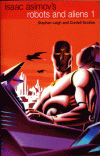I prefer the Robot City series to Robots and Aliens. At the end of Robot City I felt like everything was building up to a new series, which it was. I don’t think that Robots and Aliens did a good enough job to tie everything together. It seemed like just the last few chapters of Book 6 were used to close any loose ends in the plot lines.
One of my biggest questions that started early on in Robot City was: How do these aliens, Aranimas and Wolruf, fit into the universe that Asimov created? By the end of Robot and Aliens we are aware of 6 unique alien species. Four of these live on just two worlds and are interconnected by trade. It seems that after thousands of years they would expand and eventually run into the Galactic Empire from the Foundation novels.
Jerry Oltion ties off this question in just a few pages toward the end of Humanity. Two of the robots from Aurora convince Adam, Eve, and Lucius to reconsider allowing future Robot Cities to aid in colonizing worlds for humans. They speak of an early form of psychohistory that they argue shows that humans would be better off without direct intervention from robots. This fits with the progression of Asimov’s own novels which take place before and after these two series end. The idea certainly seems plausible, but it seems to me like an easy way out to play around with the plotlines.
One detail which I was disappointed to see overlooked was the origin of the Keys to Perihelion. No further explanation as to how they work, or what actually controls or created Perihelion is given. There isn’t any comment as to how Dr. Avery discovered the technology in the first place. It bugs me that a device that is integral to most of the plot in the series is left unexplained.
Another serious problem is the transition between the last book, Humanity, and a new trilogy beginning with Mirage. I read this trilogy by Tidemann back in 2002 without ever thinking to read Robot City first. It turns out that it didn’t really matter. I don’t think there is any connection between these two series at all, even though Derec and Ariel play major roles. I can only assume that their memories were erased, again, through the intervention of the robots. It seems to me there should have been a transition novel after Robots and Aliens to explain what actually happened.


